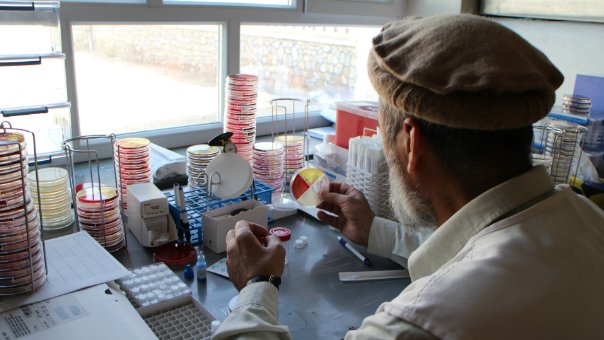AMR: Behind the headlines
26 Jul 2016
Written by Dr Grania Brigden
Grania is TB and AMR Advisor for the Access Campaign at Medecins Sans Frontieres.
It is difficult to ignore antimicrobial resistance (AMR) when news articles have scary headlines, like “10 million lives lost per year by 2050” and “Will cost around $100 trillion.” But what does that actually mean?
There is already an infection out there that is facing the reality predicted by doomsday headlines: tuberculosis. TB, a curable infection that no one should die from, has somehow become the leading global infectious disease killer.
It’s a disease that now has multi drug-resistant forms that require long, complicated and expensive treatments which can render patients deaf, psychotic and facing daily painful injections. The result is an at-best 50% chance of being cured. It’s much worse for people who have extensively resistant versions of TB. For them, it’s a 20% chance.
Once upon a time resistance was caused by misuse of the antibiotics available to treat TB. Those times are gone. The drug-resistant forms are spreading directly so that people who have never had TB are getting the resistant forms as their first type of TB. With more people dying and the price of treating DR-TB rising, the headlines no longer seem so far-fetched.
Doctors have known for some time that our usual antibiotics aren’t working anymore, and people increasingly need to change to stronger, more toxic antibiotics. But this comes at a financial and human cost: stronger, last-line antibiotics are more expensive, and are often associated with side effects that can have short- and long-term effects, including seizures, hearing loss, and blood disorders.
We are even seeing people with infections we don’t have any medicines for. This is not a challenge just for the UK, it is seen everywhere.
Using a microscope to look at the sputum to count the number of TB bacilli.

On the ground
Drug-resistant bacterial infections are a growing challenge for Medicine Sans Frontieres (MSF). MSF doctors are treating resistant infections in war-wounded people in Jordan, in newborns in Niger, and in people in our burns units in Iraq. Where we have access to diagnostics, we have documented the presence of highly resistant bacteria, such as ESBL, CRE and MRSA, in several of our projects, and have recently started using last-line antibiotics to treat multi drug-resistant bacteria.
The patients we are seeing are the ‘lucky ones’ – they have been able to get access to hospital care, get access to a diagnostic test, and finally get access to the antibiotics needed to treat their infection.
Is lack of access of access to antibiotics a bigger problem?
It is an unfortunate reality that although much has been said about the misuse of antibiotics (and that is a serious issue), there are many people who are still dying due to a lack of access to antibiotics to begin with.
As a doctor who has treated people in the UK and Uganda for drug-resistant infections, including drug-resistant forms of TB, I know that while access to treatment may be better in the UK, the future for both of these countries – for all countries – when it comes to drug-resistant infections is equally bleak. We lack the treatments and the diagnostics that let us know we are treating someone for the right infection with the right drug.
The test that I had access to for TB when I worked in Uganda was unable to help me manage the HIV-positive child whose parents had had multiple courses of treatment for TB. Diagnostics like sputum microscopy (1) don’t work well in HIV co-infected patients and children, and don’t diagnose drug resistant forms of TB. I have seen patients die due to a lack of diagnosis.
Diagnosis and treatment
Over the past few years TB tests have been improved with the development of a rapid diagnostic test that reduced time to diagnosis from six weeks to two hours, and helped detect resistance to the most important antibiotic.
The Longitude Prize recognises that to fully combat the challenge of AMR, diagnostics must go hand in hand with treatment. The Prize criteria will ensure that any diagnostic test developed for AMR will be suitable for everyone, no matter where in the world they live. We need to make sure that the headlines do not become reality.
